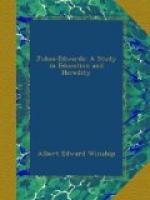The eight children were all boys, and all but one grew to manhood. Timothy was a hardware merchant in New Haven and New York for more than forty years. He endowed the “Dwight Professorship of Didactic Theology in Yale,” which was named for him. There were nine children, grandchildren of President Dwight by his eldest son. Of these the eldest, also Timothy, was the leading paper manufacturer in the trust mill headquarters at Chicago, and his six children were enterprising and successful business men in Illinois and Wisconsin. John William Dwight was one of the leading manufacturers of chemicals in Connecticut. Edward Strong Dwight, of Yale, 1838, and of Theological Seminary, Yale, was for many years a trustee of Amherst and a prominent clergyman. J.H. Lyman, M.D., and Edward Huntington Lyman, M.D., were names that added luster to the family of President Dwight. Benjamin Woolsey Dwight, M.D., another son of the President of Yale, was a graduate of Yale and treasurer of Hamilton college for nineteen years. Among his descendants are Richard Smith Dewey, M.D., of Ann Arbor, in charge of Brooklyn City Hospital; charge of military hospital at Hesse Cassel in Franco-Prussian war; assistant superintendent Illinois State Insane hospital at Elgin. Also Elliott Anthony, of Hamilton, 1850; Chicago lawyer; city attorney; a member of the Illinois Constitutional Convention in 1862 and again in 1870; founder of the Law Institute, Chicago, and for several years the president. Also Edward Woolsey Dwight, who was a leading citizen and legislator of Wisconsin.
It is impracticable to give the record of many of the distinguished members of such a family, but a brief notice of a few will give some idea of the standard of the family.
Benj. Woodbridge Dwight, Ph.D., b. 1816, g. Hamilton 1835, Yale Theological Seminary, professor in Hamilton; founded Central Presbyterian church, Joliet, Ill.; established “Dwight’s High School,” Brooklyn; editor-in-chief of “The Interior” of Chicago, which he owned and edited; contributor to many magazines; author of several scholarly works; had the first preparatory school which placed German on a level with Greek in importance, and founded a large preparatory boarding school at Clinton, N.Y. He was a man of rare ability, character and success.




